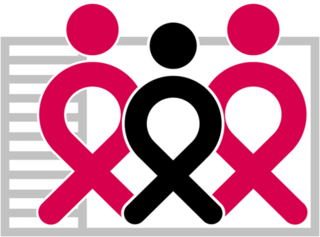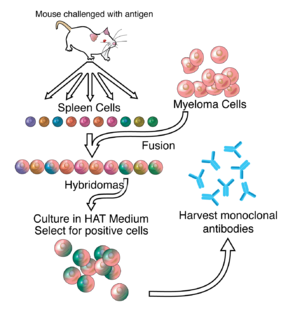
Regeneron Pharmaceuticals, Inc. is an American biotechnology company headquartered in Tarrytown, New York. The company was founded in 1988. Originally focused on neurotrophic factors and their regenerative capabilities, it branched out into the study of both cytokine and tyrosine kinase receptors.
Tocilizumab, also known as atlizumab, is an immunosuppressive drug, mainly for the treatment of rheumatoid arthritis (RA) and systemic juvenile idiopathic arthritis, a severe form of arthritis in children. It is a humanized monoclonal antibody against the interleukin-6 receptor (IL-6R). Interleukin 6 (IL-6) is a cytokine that plays an important role in immune response and is implicated in the pathogenesis of many diseases, such as autoimmune diseases, multiple myeloma and prostate cancer. It was developed by Hoffmann–La Roche and Chugai.
Pritumumab (PTB) is a human monoclonal antibody targeted against glioma. It works by binding to the ecto-domain of vimentin on the surface of cancer cells. developed by Nascent Biotech.

The Dale and Betty Bumpers Vaccine Research Center, more commonly known as the Vaccine Research Center (VRC), is an Intramural Division of the National Institute of Allergy and Infectious Diseases, one of the US National Institutes of Health. The mission of the VRC is "to conduct research that facilitates the development of effective vaccines for human disease." The primary focus of research is the development of vaccines for AIDS, but the VRC also is working to develop vaccines for Ebola and the Marburg virus, and therapeutic antibodies against SARS-CoV2.
Alirocumab is a biopharmaceutical drug approved by the FDA on July 24, 2015 as a second line treatment for high cholesterol for adults whose cholesterol is not controlled by diet and statin treatment. It is a human monoclonal antibody that belongs to a novel class of anti-cholesterol drugs, known as PCSK9 inhibitors, and it was the first such agent to receive FDA approval. The FDA approval was contingent on the completion of further clinical trials to better determine efficacy and safety.
Fasinumab is a human monoclonal antibody designed for the treatment of acute sciatic pain.
Leonard S. Schleifer is the co-founder and chief executive of the biotechnology company Regeneron Pharmaceuticals.

ZMapp is an experimental biopharmaceutical drug comprising three chimeric monoclonal antibodies under development as a treatment for Ebola virus disease. Two of the three components were originally developed at the Public Health Agency of Canada's National Microbiology Laboratory (NML), and the third at the U.S. Army Medical Research Institute of Infectious Diseases; the cocktail was optimized by Gary Kobinger, a research scientist at the NML and underwent further development under license by Mapp Biopharmaceutical. ZMapp was first used on humans during the 2014 West Africa Ebola virus outbreak, having only been previously tested on animals and not yet subjected to a randomized controlled trial. The NIH ran a clinical trial starting in January 2015 with subjects from Sierra Leone, Guinea, and Liberia aiming to enroll 200 people, but the epidemic waned and the trial closed early, leaving it too statistically underpowered to give a meaningful result about whether ZMapp worked.
Rinucumab (REGN2176) is a monoclonal antibody designed for the treatment of neovascular age-related macular degeneration.
Crotedumab (REGN1193) (INN) is a humanized monoclonal antibody designed for the treatment of diabetes.
Trevogrumab is a human monoclonal antibody designed for the treatment of muscle atrophy due to orthopedic disuse and sarcopenia.
Suptavumab (INN; development code is a humanized monoclonal antibody designed for the prevention of medically attended lower respiratory tract disease due to respiratory syncytial virus.
REGN-EB3 is an experimental biopharmaceutical treatment comprising three monoclonal antibodies under development by Regeneron Pharmaceuticals to treat Ebola virus disease. In August 2019, Congolese health officials announced that REGN-EB3 and a similar monoclonal antibody treatment, mAb114, were more effective than two other treatments being used at the time.

Drug repositioning is the re-purposing of an approved drug for the treatment of a different disease or medical condition than that for which it was originally developed. This is one line of scientific research which is being pursued to develop safe and effective COVID-19 treatments. Other research directions include the development of a COVID-19 vaccine and convalescent plasma transfusion.

Operation Warp Speed (OWS) is a public–private partnership, initiated by the Trump administration, to facilitate and accelerate the development, manufacturing, and distribution of COVID-19 vaccines, therapeutics, and diagnostics. Operation Warp Speed was introduced in early April 2020, after a round-table meeting with Trump, Pence and industry executives at the White House on March 2. It will promote mass production of multiple vaccines based on preliminary evidence allowing for faster distribution if clinical trials confirm one of the vaccines is safe and effective. The plan anticipates that some of these vaccines will not prove safe or effective, making the program more costly than typical vaccine development, but potentially leading to the availability of a viable vaccine several months earlier than typical timelines. Congress allocated on March 27 nearly $10 billion for Operation Warp Speed through the Coronavirus Aid, Relief, and Economic Security (CARES) Act, with $6.5 billion designated by Congress for countermeasure development through BARDA, along with $3 billion for NIH research.

The Randomised Evaluation of COVID-19 Therapy is a large-enrollment clinical trial of possible treatments for people in the United Kingdom admitted to hospital with severe COVID-19 infection. As of 17 June 2020, the trial included six proposed interventions: five repurposed drugs and convalescent plasma.
Atoltivimab/maftivimab/odesivimab, sold under the brand name Inmazeb, is a fixed-dose combination of three monoclonal antibodies for the treatment of Zaire ebolavirus. It contains atoltivimab, maftivimab, and odesivimab-ebgn.
Atoltivimab is a Zaire ebolavirus glycoprotein-directed human monoclonal antibody that is part of the fixed-dose combination atoltivimab/maftivimab/odesivimab that is used for the treatment of Zaire ebolavirus.
Maftivimab is a Zaire ebolavirus glycoprotein-directed human monoclonal antibody that is part of the fixed-dose combination atoltivimab/maftivimab/odesivimab that is used for the treatment of Zaire ebolavirus.
Odesivimab is a Zaire ebolavirus glycoprotein-directed human monoclonal antibody that is part of the fixed-dose combination atoltivimab/maftivimab/odesivimab that is used for the treatment of Zaire ebolavirus.





